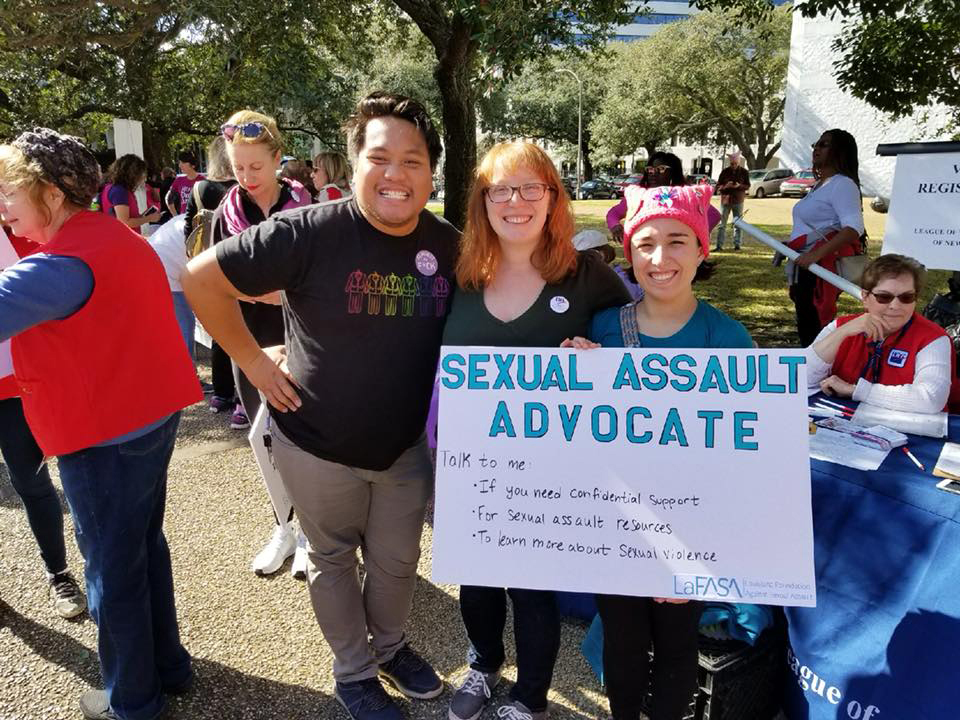
Giving back: LaFASA
‘You are not alone.” That is the poignant phrase that headlines the #MeToo movement’s website and mission. Over the past months, the simple hashtag has captivated the world as survivors and supporters have taken to social media, marches and even award shows to demonstrate the power of solidarity in putting an end to years of silence by speaking out about sexual assault.
And while the Grammys speeches and over 12 million posts are driving forces in the conversation, real and lasting change is made through the organizations that not only make speaking out possible, but work tirelessly to redefine the rhetoric of sexual assault and resolve the power imbalance that remains prevalent.
One of these organizations is something you likely have not heard of, despite its central location right off Perkins Road. Louisiana Foundation Against Sexual Assault, or LaFASA, has been part of the conversation since 1985. However, as executive director Rafael de Castro notes, the organization has seen increased attention in recent months.
“Our attorney’s caseload has been increasing,” explains de Castro. “I think the fact that more people are coming forward is showing others that sexual assault is okay to talk about. It’s a commentary on how important the issue is.”
Originally founded in Hammond by Judy Benitez as a small and informal feminist organization, LaFASA moved to Baton Rouge in the fall of 2013 to be closer to the Capitol. As a coalition, LaFASA works with the 11 rape crisis centers in Louisiana as well as with businesses, schools, law enforcement and more both to deal with the effects of sexual assault and to work to undermine the harmful rhetoric that serves to perpetuate violence.
“When we work with companies, it’s not about covering them from lawsuits,” says de Castro. “We are focused on teaching the best practices in order to make everyone in a workplace feel safe.”

Coming from a background in engineering and business, de Castro joined LaFASA after years of work with Baton Rouge’s Youth Oasis. Moved to action through the stories of the children there, de Castro is committed to making a difference in the Capital City and throughout Louisiana.
“I spent too many days with young children who had experienced violence,” says de Castro. “I felt I was more of a Band-Aid than anything, so I decided I wanted an opportunity to make more lasting changes.”
With no money in the state’s budget allocated for sexual assault victims or prevention, the LaFASA team has set its sights on Louisiana’s legislature as the place in which change must occur.
“Everyone thinks rape is bad,” says Brittany Hunt, LaFASA’s justice systems coordinator. “By working toward legislation that targets the more covert ways sexual violence is normalized, we are trying to make sure people see all the pieces of the puzzle that make it wrong.”
This May, LaFASA will hold its annual Day at the Capitol, during which the organization and its supporters will gather downtown to show Louisiana lawmakers the importance of legislation that protects survivors while serving to bring systematic change throughout the state and the nation.
“We hold press conferences with advocates and sit in on committee meetings,” says Hunt of the daylong event. “There are a select few legislators who are our champions, but events like these are important in showing all lawmakers how pressing the issue is.”
And as the #MeToo movement continues to grow and evolve, Hunt, de Castro and the rest of the LaFASA team want to encourage people to not only tell their stories, but to take an active role in preventing violence from occurring.
“People are less familiar with LaFASA because we work mostly behind the scenes,” says de Castro. “But our goal is to work through organizations to make sure the best practices are being utilized to create a culture that prevents sexual assault.”











